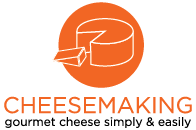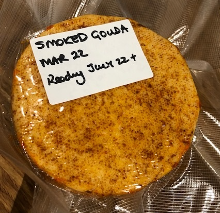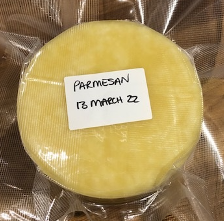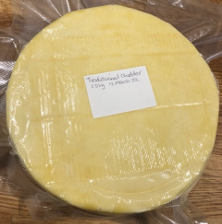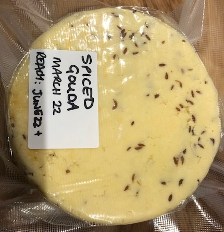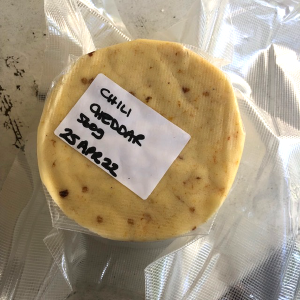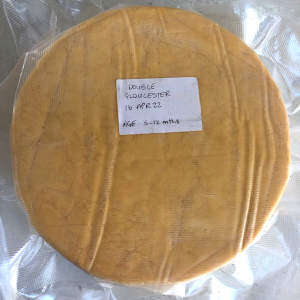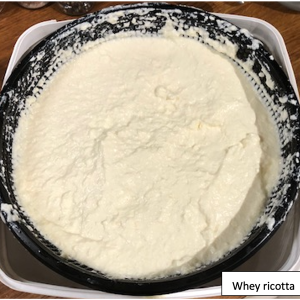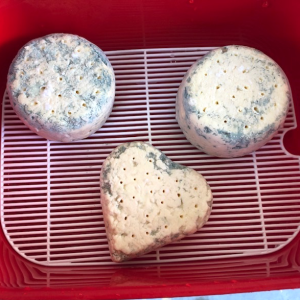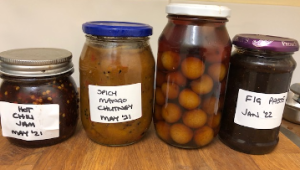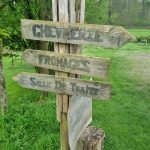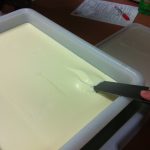When did you take up cheesemaking and why?
I’ve always liked making things from scratch as you know what is in them, and there are always fewer chemicals and preservatives, plus there is the added satisfaction of knowing that you made it rather than bought it. We are moving to Tasmania in a few years’ time to ease into retirement and a self-sufficient lifestyle, and cheese was another on the list of things to learn how to make. For my birthday in December 2021, my husband bought me a cheesemaking course with Graham (for March 2022) and my daughter purchased a cheesemaking kit that came with plenty of ‘easy’ cheese recipes – and that was it, I was hooked! So my cheesemaking journey started late last year.
What was the first batch of cheese you made by yourself? How did you feel about the experience and how did the cheese turn out? Can you compare your experience between then and now?
Never one to go slow, I made all the cheeses and cultured butter on the recipe sheets that came with the cheesemaking kit, before the cheesemaking course. The first cheese I made was the Greek-style feta which I stored in brine and the creamy feta which I chopped into cubes and aged in some oil and herbs. They were both fabulous and really spurred me on to try other types of cheeses. Initially, making cheese was a little overwhelming, with all the sanitising and equipment needed, cultures, etc etc and I was surprised by how long the process takes, particularly if you take into account the turning, salting, drying and so on, but as you progress, the process becomes easier and you can multitask whilst cultures are ripening or rennet is setting the curd and set up 2 or 3 batches of different cheese at the same time.
What sort of cheeses (& dairy products eg yoghurt) do you make, how many times have you made cheese, why do you like making cheese and how often do you make it?
I regularly make yoghurt, and have been completely converted since making cultured butter – it is so expensive in the shops, but so easy to make at home, utterly delicious and much cheaper. I have made quite a few cheeses in the last 4 months including feta (Greek, creamy and Persian), halloumi, camembert, triple cream brie, blue brie, Farmhouse Cheddar, Traditional aged Cheddar, Raclette, Mozzarella, whey ricotta, Quark, cream cheese, smoked Gouda (also rubbed with a smoked paprika and oil mix), spiced Gouda (with cumin seeds), Parmesan and Double Gloucester. Initially, I was making cheese every weekend, but the family soon got fed up with me spending all weekend engrossed in the kitchen! Now I put aside one weekend a month to focus on my cheesemaking and I try to make 3-5 different cheeses on that weekend.
What have been some interesting or rewarding cheesemaking experience/s
To me, making something from scratch using wholesome ingredients and no preservatives, to feed to your family and friends is reward enough. It’s fascinating to understand the chemistry behind turning milk into cheese, and how relatively small differences, such as temperature, which cultures are used, how small the curds are cut and how long or vigorously you stir the cheese can make such a difference to the final outcome.
What has been your biggest cheesemaking challenge/s
I had a massive fail the first time I tried to make Mozzarella when the curd just dissolved when it was put into the hot water for stretching! I have learnt since that this was due to having the incorrect balance of acid and a second attempt was much improved, although the cheese was still a bit rubbery. I have still to master the art of Mozzarella. The biggest challenge for me is having the patience to wait for the cheeses to mature! I really love strong Cheddar cheese, but that takes 2 years to mature and I’m not sure I’m going to be able to wait that long! The yield of cheese you get from 1L of milk is also not very much, depending on the type of cheese, and so it was quite a learning curve initially. Also, if you want to age cheeses for a long time, they should be relatively large and so I now make Cheddar, Parmesan etc from 14-16L of milk and have bought a very large pot, just for this.
What is your favourite cheese(s) to make?
I haven’t made all the cheeses I wish to try yet, but of those I have made so far, it would have to be Raclette, as this is not easy to find in the shops and is ridiculously expensive, but relatively easy to make. There is a lot of aftercare involved in regularly washing and turning the cheese, but the satisfaction in seeing the rind develop the characteristic orange hue and being able to smell the development of the flavour is very rewarding. I look forward to trying it in a couple more months’ time.
What cheese do you regularly have in your fridge OR What cheese cannot you do without
We always have plenty of mature Cheddar, a Brie or Camembert and a goat cheese in our fridge.
What is your advice to anyone looking to start out on a cheesemaking journey?
Just give it a go – it’s so much fun! It can be quite expensive to buy the equipment but you can also make do with stuff you already have for some of it. For example, I do not use a water bath or cheese vat to keep the milk/cheese warm as I find the milk maintains its temperature better in the pot it was warmed in, and it’s a lot less fiddly than constantly adjusting the temp of the vat. Taking a course in cheesemaking will give you confidence in experimenting and enable you to ask any questions you may have. If you have pets, keep the whey as a delicious and nutritious snack for them – they love it, even the chickens!
Do you have a favourite cheesemaking recipe that you can share with others? (others do like to copy their recipes). An image of that cheese is helpful
I have attached my recipe for making Raclette. Here is what the cheese looks like after affinage for 1 month and just before washing.
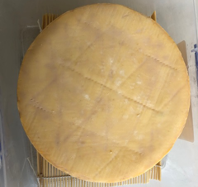
Do you have a favourite cheese(s) and cheese pairing(s)
Cheddar cheese and pickled onions or Raclette cheese and new potatoes.
What cheese do you want to make but have not made?
Next on my list is Boursin and Stout Cheddar
Do you have any equipment you like to use?
Nothing particularly fancy, just normal pots, knives, moulds etc. I like to age my cheese in a plastic tub raised off the floor, containing a small dish and covered with bamboo sushi mats to ensure good airflow around the cheese. Our cheese cave is an old bar fridge turned to its warmest setting, that maintains temp at ~10oC and works quite well. A vacuum packing machine helps with storage in the fridge as the cheeses can all be stacked on top of one another and mould growth is inhibited.
Images of your cheese’s past and present.
Is there a favourite book or resource that you reference most to get technical information?
Apart from Graham’s course notes, I use Gianaclis Caldwell’s books Mastering Basic Cheesemaking and Mastering Artisan Cheesemaking for background technical information on the process itself and these books also have many great recipes for the different styles of cheese. I also support the New England Cheesemaking Supply company website, although this requires the conversion of many ingredients from American to English. The temperatures are easy to convert from Fahrenheit to Celsius, gallons to litres, and Graham has a conversion chart for the different cultures on his website.
Do you have food-related hobbies outside of cheese, we all like these sorts of foods so include references and images of them also. e.g. sausages, small goods, meats, wine, bread, jams, chutneys, cakes…
I like to have a go at most things, and have a relatively large fruit and veg garden, meaning that there are often gluts of produce, so I make many chutneys, jams, and relishes, although tend to give most of these away! I also love to make bread, especially sourdough.
I hope that you enjoyed the article.
Nicky
My Raclette Recipe
Raclette cheese
The volume of milk and brand:
For 15L milk: 1 dash & 1 pinch spoon mesophile, such as M244
- 1 pinch Brevibacterium linens
- 1 pinch SX34
- 4mL CaCl2
- 4mL Rennet
Expected yield: 2.3kg from 15L
| Step | Time | Actual time | Milk temp | Actual temp | comments |
| Milk | N/A | 31oC | |||
| Cultures* | 0.00 | 31oC | Inc 5 mins, then stir. Ripen 1hr 15 mins | ||
| CaCl2 | When warm | 31oC | Stir and inc 5 mins. | ||
| Rennet | 0.45 | 31oC | Stir 1 min, baffle, incubate 45-60 mins | ||
| Cut curds | 1.30 | 31oC | 1cm cubes, rest 5 min | ||
| Stir | 1.35 | 31oC | 20 mins, let curds settle 5 mins | ||
| Cook | 2.00 | =>38oC | Heat 3L water to 63oC. Remove 11 cups of whey, and replace it with 63oC water to reduce acidity. The temp should be 38oC. | ||
| Stir | 2.10 | 38oC | 10 mins, let curds settle for 5 mins | ||
| Remove whey** | 2.30 | 38oC | Pour curds into a cloth-lined colander to drain – will be one big mass of curds | ||
| Press 1 | 2.35 | 38oC | Add to cloth lined mould, add 5kg press for 15 min | ||
| Press 2 | >27oC | Flip, redress, press with 5kg, 30 min | |||
| Press 3 | >27oC | Flip, redress, press with 10kg, 60 min | |||
| Press 4 | >27oC | Flip, redress, press with 15kg, 12+ hours | |||
| Brine | >27oC | 10 hours, turning at 5h. Salt top side | |||
| Dry | >27oC | 24h, turning after 12h | |||
| Washing | 10-13oC, 80-95% RH | Wash with 3% brine on day 3, then wash and turn every second day from day 5 until day 30, with Morgue solution (1L 3% brine + 1 drop spoon KL + 1 drop spoon SX34 + 1 drop spoon B. linens) using a sterile dropper and rubbing gently with clean hands. Adjust RH by adding or removing a little water from the base of the tub, or opening/closing the lid. The aim is to modify the amount of moulds growing, and encourage B. linens to grow – the rind will turn orange-red. After this, wash and turn weekly. | |||
| Age | 10-13oC
90% RH |
2-4 months. | |||
| Tasting notes:
|
|||||
